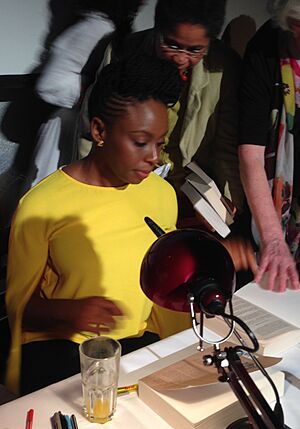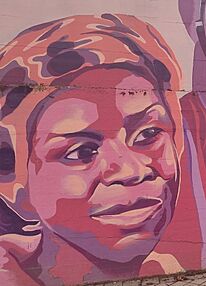Chimamanda Ngozi Adichie facts for kids
Quick facts for kids
Chimamanda Ngozi Adichie
|
|
|---|---|

Adichie in 2013
|
|
| Born | Grace Ngozi Adichie 15 September 1977 Enugu, Enugu State, Nigeria |
| Occupation | Writer |
| Alma mater | Eastern Connecticut State University Johns Hopkins University Yale University |
| Genre | Novel, short story, memoir, children's book |
| Years active | 2003–present |
| Notable awards | Full list |
| Spouse |
Ivara Esege
(m. 2009) |
| Children | 3 |
| Signature | |
 |
|
Chimamanda Ngozi Adichie (born 15 September 1977) is a famous Nigerian writer. She is known for her novels, short stories, and children's books. Her most popular books include Purple Hibiscus (2003), Half of a Yellow Sun (2006), and Americanah (2013). Adichie is also known for her powerful speeches about feminism and storytelling.
Adichie was born in Enugu, Nigeria, to an Igbo family. She studied medicine for a short time at the University of Nigeria. When she was 19, she moved to the United States to continue her education. She studied at several American universities, including Eastern Connecticut State University, Johns Hopkins University, and Yale University.
Her stories often explore themes like culture, religion, gender, and what it's like to move to a new country. She is inspired by Nigerian writers like Chinua Achebe and Buchi Emecheta. Adichie's writing often mixes Western and African ideas, especially from her own Igbo culture.
Besides writing, Adichie is a well-known public speaker. Her 2009 TED Talk, "The Danger of a Single Story," is one of the most-viewed TED Talks ever. Her 2012 talk, "We Should All Be Feminists," was so popular that parts of it were used in a song by the American singer Beyoncé. Adichie has won many awards for her work, including a MacArthur Fellowship in 2008.
Contents
Early Life and Education
Adichie was born on 15 September 1977, and was the fifth of six children. She grew up in the town of Nsukka, Nigeria, on the campus of the University of Nigeria. Her family lived in a house that was once home to the famous Nigerian writer Chinua Achebe.
Her father, James Nwoye Adichie, was a professor of statistics. Her mother, Grace Odigwe, was the first woman to work as the university's registrar, which is a high-level administrative job. During the Biafran War (1967-1970), a major conflict in Nigeria, her family faced many hardships and lost both of her grandfathers.
As a child, Adichie loved to read, but most of the books she found were by British authors like Enid Blyton. The characters in these books were white and blue-eyed, which was very different from her own life. When she was 10, she discovered African books like Things Fall Apart by Chinua Achebe. This was a turning point for her. She realized that people who looked like her could also be in stories.
She was a top student in high school. After graduating, she studied medicine and pharmacy at the University of Nigeria for a year and a half. At age 19, she left Nigeria to study in the United States. She first went to Drexel University in Philadelphia.
Later, she transferred to Eastern Connecticut State University, where she graduated with top honors in 2001. She went on to earn a master's degree in creative writing from Johns Hopkins University in 2003 and another master's degree in African Studies from Yale University in 2008.
Writing Career
Adichie began writing her first novel, Purple Hibiscus, while she was studying in the United States. She was feeling homesick and decided to set the story in her childhood town of Nsukka. The book is about a teenage girl named Kambili whose family is torn between strict Catholic beliefs and traditional Igbo traditions. It was published in 2003 and won many awards.

Her second novel, Half of a Yellow Sun, was published in 2006. The book is set during the Biafran War. It tells the story of the war through the eyes of three main characters whose lives are changed forever by the conflict. Adichie spent four years researching the book, using her father's memories of the war to help her write it. This novel also won major awards, including the prestigious Orange Prize for Fiction.
In 2009, Adichie published a collection of short stories called The Thing Around Your Neck. The stories are about the experiences of Nigerians, both in Nigeria and in America. They explore feelings of loneliness, love, and the challenges of living between two different cultures.
Her third novel, Americanah, came out in 2013. It tells the story of a young Nigerian woman named Ifemelu who moves to the United States for college. The book explores what it means to be Black in America and the United Kingdom, and how identity can change when you live abroad. Americanah was a huge success and won the National Book Critics Circle Award.
Adichie has also written books based on her famous speeches. We Should All Be Feminists (2014) and Dear Ijeawele, or A Feminist Manifesto in Fifteen Suggestions (2017) explain her ideas on feminism and equality in a simple, powerful way. In 2020, she published Notes on Grief, a personal book about losing her father.
Famous Speeches
Adichie is a powerful and inspiring public speaker. She has given several famous talks that have been watched by millions of people around the world.
The Danger of a Single Story
In 2009, Adichie gave a TED Talk called "The Danger of a Single Story." In this speech, she explained that when we only hear one story about a person or a place, it creates stereotypes. Stereotypes are incomplete and can be harmful.
She shared her own experiences, like how her American roommate was surprised that she could speak English and listened to American pop music. Her roommate had a "single story" of Africa as a place of poverty and disaster. Adichie argued that we need to listen to many different stories to truly understand the world and each other. This talk has become one of the most popular TED Talks of all time.
We Should All Be Feminists
In 2012, Adichie gave another famous talk called "We Should All Be Feminists." She shared personal stories to show how boys and girls are raised differently and face different expectations. She argued that a feminist is simply someone who believes in the social, political, and economic equality of the sexes.
She said that everyone, both men and women, would be happier and freer if we got rid of unfair gender roles. The talk was so influential that it was published as a book. The singer Beyoncé even used a part of the speech in her song "Flawless," which introduced Adichie's ideas to a huge new audience.
Style and Themes
Adichie's writing style is known for being clear, powerful, and full of emotion. She often mixes English with words and phrases from the Igbo language, which helps to ground her stories in Nigerian culture.
Common Themes in Her Work
- Culture and Identity: Many of her characters struggle with their identity. They try to balance their African heritage with Western culture. Her books celebrate Igbo traditions, language, and history.
- The Biafran War: The war is a recurring theme in her work, especially in Half of a Yellow Sun. She explores how the conflict affected families and shaped the history of Nigeria.
- Feminism and Gender: Adichie often writes about strong female characters who challenge unfair expectations. She explores the challenges women face in society and their journey to find their own voice and power.
- Immigration: Her stories often show the experiences of Nigerians who move to America or England. She writes about the loneliness, discrimination, and confusion they can feel, as well as the ways they adapt and find a new sense of belonging.
Legacy and Influence
Chimamanda Ngozi Adichie is one of the most important writers of her generation. Her books have been translated into more than 30 languages and have sold millions of copies worldwide. She has proven that there is a large global audience for stories about African experiences.

She is often called "the literary daughter of Chinua Achebe" because, like him, she tells powerful stories about Nigeria. Her work has inspired a new generation of African writers to share their own stories.
Beyond her books, Adichie has become a global icon for feminism. Her clear and relatable way of talking about equality has made the ideas of feminism accessible to many people who might not have understood it before.
Adichie has received many awards and honors for her work. She has been given 16 honorary degrees from universities around the world, including Yale and Johns Hopkins. In 2017, she was elected to the American Academy of Arts and Sciences, a high honor for artists and scientists.
See also
 In Spanish: Chimamanda Ngozi Adichie para niños
In Spanish: Chimamanda Ngozi Adichie para niños
 | Laphonza Butler |
 | Daisy Bates |
 | Elizabeth Piper Ensley |

